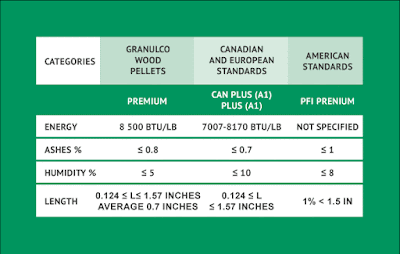WOOD PELLET CERTIFICATE STANDARDS
As a trading commodity that is becoming a world trend, many wood pellet standards are enforced. Basically, the wood pellet standard is sufficient for only 2 things, namely quality and sustainability, which have a lot to do with environmental aspects.
Many quality aspects
are related to the technical aspects of wood pellet production and also the raw
materials used. A number of countries or certain institutions apply the quality
aspects that they can accept for these wood pellet products.
The application of
wood pellet quality standards is also related to the use of wood pellets or
more specifically technology or tools to consume or use wood pellets as fuel.
Based on this,
usually the market segments are also differentiated, namely for industry and
households. The industrial segment has its own specifications that are slightly
different from that of households. Some of the quality standards that are
widely used today: ENplus, DINplus, PFI, ITEBE, Onorm and CANplus. The
following are the quality tables:
The second type of
standard is about sustainability and is currently starting to be widely
applied, especially for the trade in wood pellets in large quantities.
Sustainability
standards include the practice of cultivating trees whose wood is the source of
the wood pellet raw material. In terms of its application, there are a number
of wood pellet buyer countries who are very concerned about this sustainability
standard, but there are also some who do not really care about it.
Japan
is an example of one country in Asia that is very concerned about this issue of
sustainability standards. Some of the sustainability standards that are widely
used today: FSC, PEFC and so on
Prospective wood
pellet producers must pay attention to the above problems, because they are
closely related to the market or trade in wood pellets.
Without being able to
map the market comprehensively, it is very possible that wood pellet production
will be constrained. For example, a wood pellet producer will target its market
in Asia, especially in Japan and Korea, even though the characteristics of the
wood pellet market in Japan and Korea are different.
In recent years Indonesian has started to see the light and we are happy to be a part of a fast moving market which we believe will have a long term and sustainable part to play in our future energy mix.
Wood pellets are generally made from waste biomass products such as sawdust, tree pruning’s or grass clippings. A pellet mill is used to compact the waste biomass into an incredibly dense fuel source. Our pledge to you is to supply top quality pellets using only ethically sourced biomass.
Capacity 25.000 Tonnes/Month (Consortium Manufacturer)
Price & Order: phone: +81283285838
email: bejayawoodpellet@gmail.com
Branch Office: JL.Taman Heleconia Raya,
Block HO.2 No.20, Tarumajaya, Harapan Indah, Bekasi West Java Indonesia
PT. Bestari Anugerah Jaya Orchard Square Gos.C.02,
Kelapa Hybrida Raya, North Jakarta,
Indonesia sales@bejaya.com
Manufacturers ;
Lamongan Surabaya Wonosobo Semarang














0 komentar:
Posting Komentar